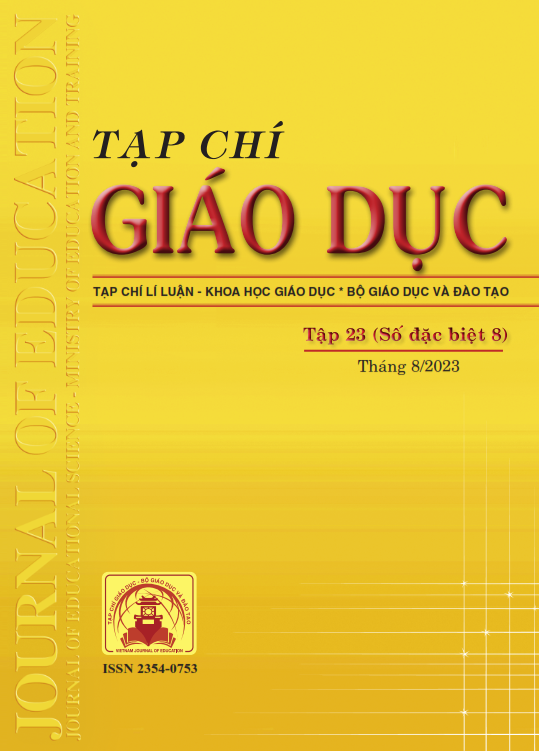Dạy học chủ đề “Liên kết hóa học” (Hóa học 10) theo mô hình lớp học đảo ngược nhằm phát triển năng lực tự học cho học sinh
Tóm tắt
In the era of technology 4.0, technology develops more and more strongly, so education needs changes, especially changes in teaching form: online teaching combined with face-to-face; about teaching methods such as switching from classroom learning to diverse learning organizations in many different forms, one of which is the application of the flipped classroom model. The paper researches and designs teaching operation process for the content “Ionic bonding” in the topic “Chemical bonding” (Chemistry 10) according to the flipped classroom model in order to develop self-study competence for students. From the experimental results, the application of the flipped classroom model has contributed to the development of students' self-study competence.
Tài liệu tham khảo
Bộ GD-DT (2018). Chương trình giáo dục phổ thông - Chương trình tổng thể (ban hành kèm Thông tư số 32/2018/TT-BGDĐT ngày 26/12/2018 của Bộ trưởng Bộ GD-ĐT).
Guy, R., & Marquis, G. (2016). The Flipped Classroom: A comparison of student performane using intruction. Issues in Informing Science & Information Technology, 9(7), 231-240.
Lage, M., Platt, G., & Treglia, M. (2000). Inverting the Classroom: A gateway to Creating an Inclusive Learning Environment. Journal of Economic Education, 25(4), 135-147.
Maertz, C. P., Fishe, C. D., King, E. B., & Tague, N. R. (2016). Developing self-directed learners: A framework for issue - based learning. Journal of Education for Busiess, 91(5), 267-273.
Marks, D.B. (2015). Flipping the Classroom: Turning an Instructional Methods Course Upside Down. Journal of College Teaching and Learning, 12(4), 241-248.
Nguyễn Chính (2016). Dạy học theo mô hình Flipped Classroom. Báo Tia Sáng - Bộ Khoa học & Công nghệ.
Nguyễn Thế Dũng, Lê Huy Tùng (2016). Dạy học kiến tạo - tương tác và phát triển năng lực sáng tạo của người học trên mô hình B-learning. Tạp chí Khoa học và Giáo dục, Trường Đại học Sư phạm - Đại học Huế, 2, 31-37.
Nguyễn Văn Đại, Đào Thị Việt Anh (2019). Xây dựng khung năng lực tự học của học sinh trung học phổ thông trong dạy Học hoá học theo mô hình Blended learning. Tạp chí Giáo dục, 458, 45- 50.
Phạm Thị Bích Đào, Nguyễn Thị Thái, Nguyễn Thị Lan Anh, Ngô Hồng Đào (2022). Vận dụng mô hình lớp học đảo ngược trong dạy học trực tuyến kết hợp với trực tiếp trong môn Hoá học ở trường trung học phổ thông. Tạp chí Khoa học Giáo dục, Viện Khoa học Giáo dục Việt Nam, 18(10), 24-30.
Staker, H., & Horn, M. B. (2012). Classifying K-12 Blended Learning. Innosight Institute.
Đã Xuất bản
Cách trích dẫn
Số
Chuyên mục
Giấy phép

Tác phẩm này được cấp phép theo Ghi nhận tác giả của Creative Commons Giấy phép quốc tế 4.0 .












